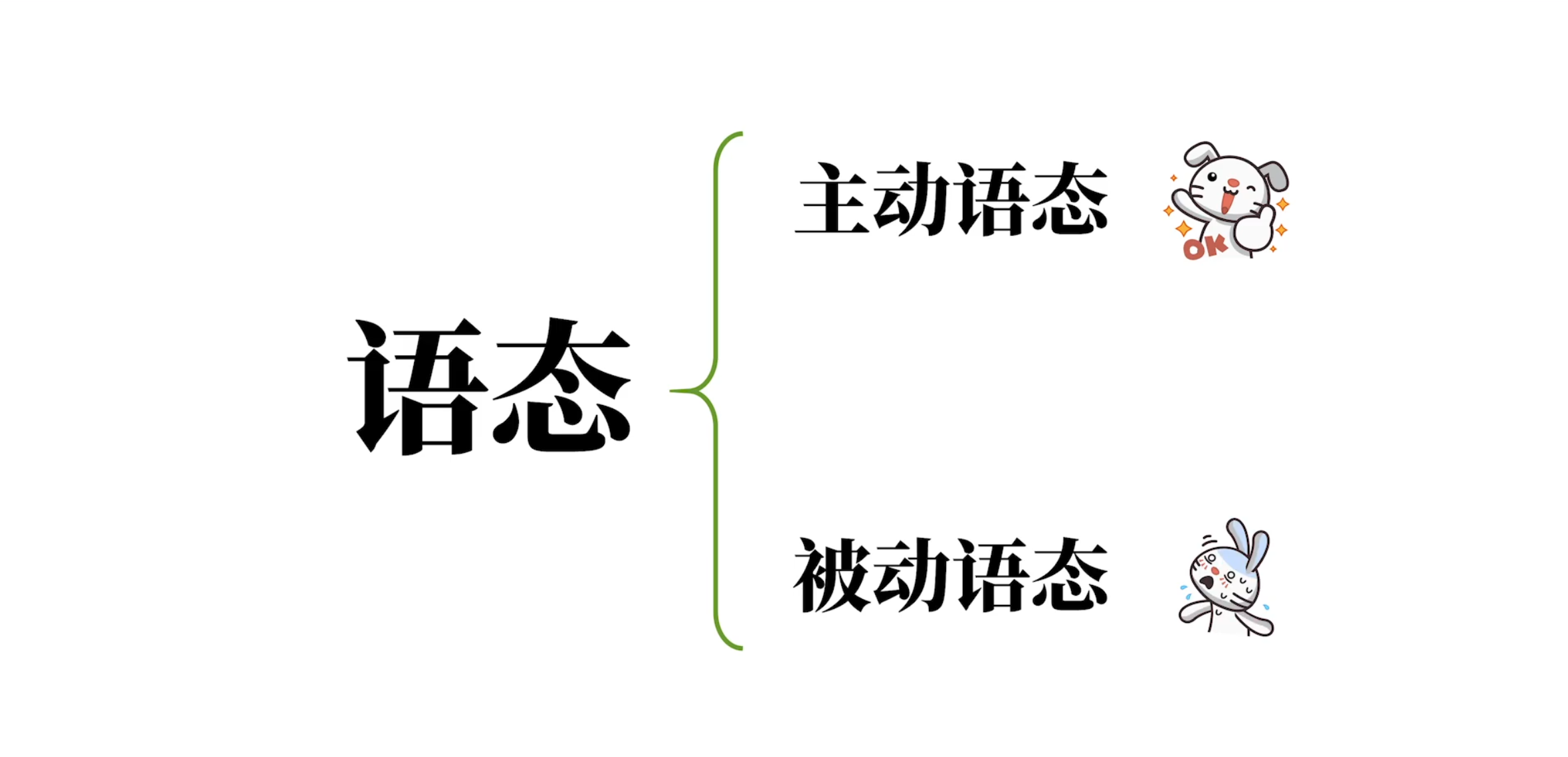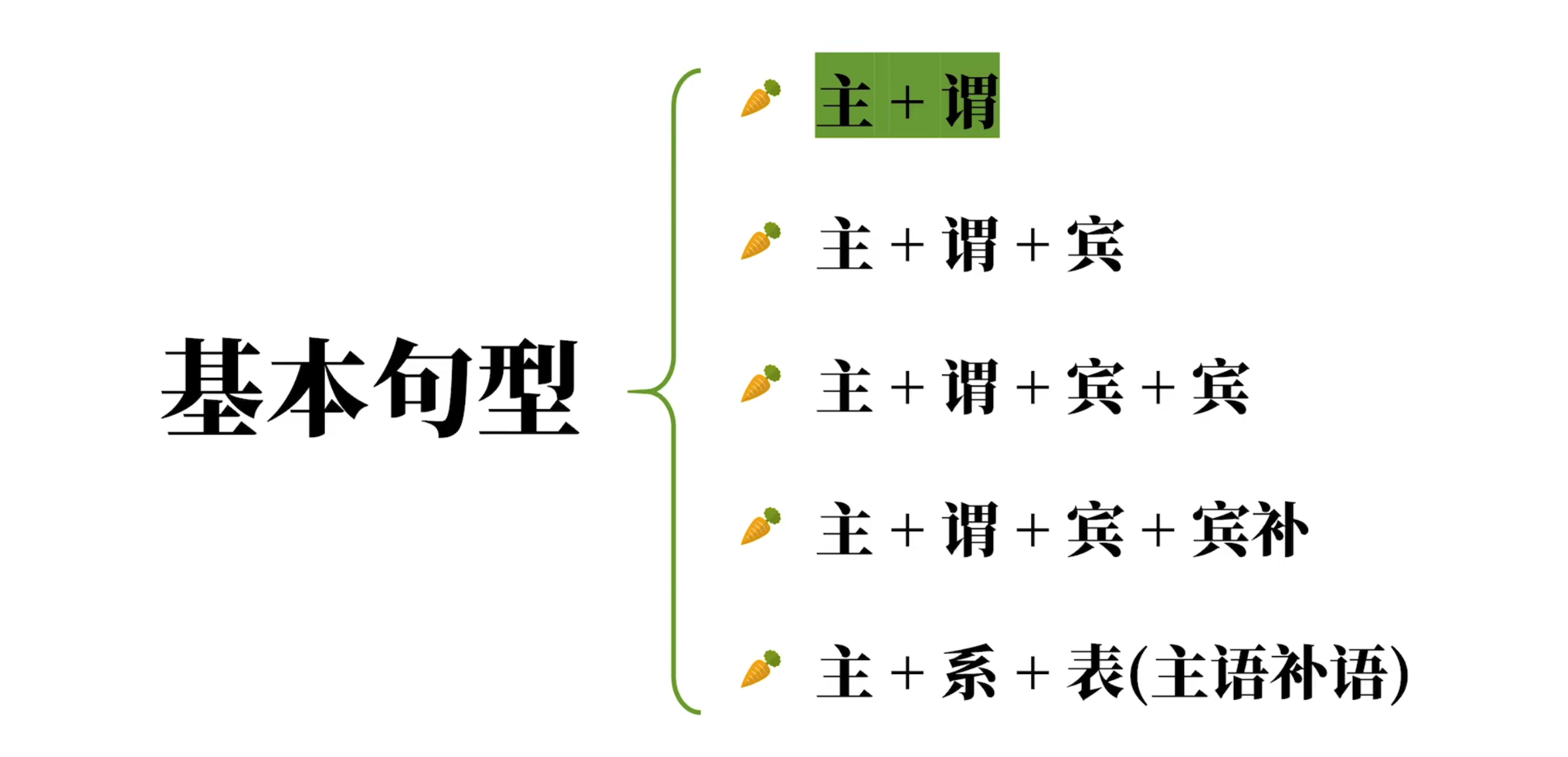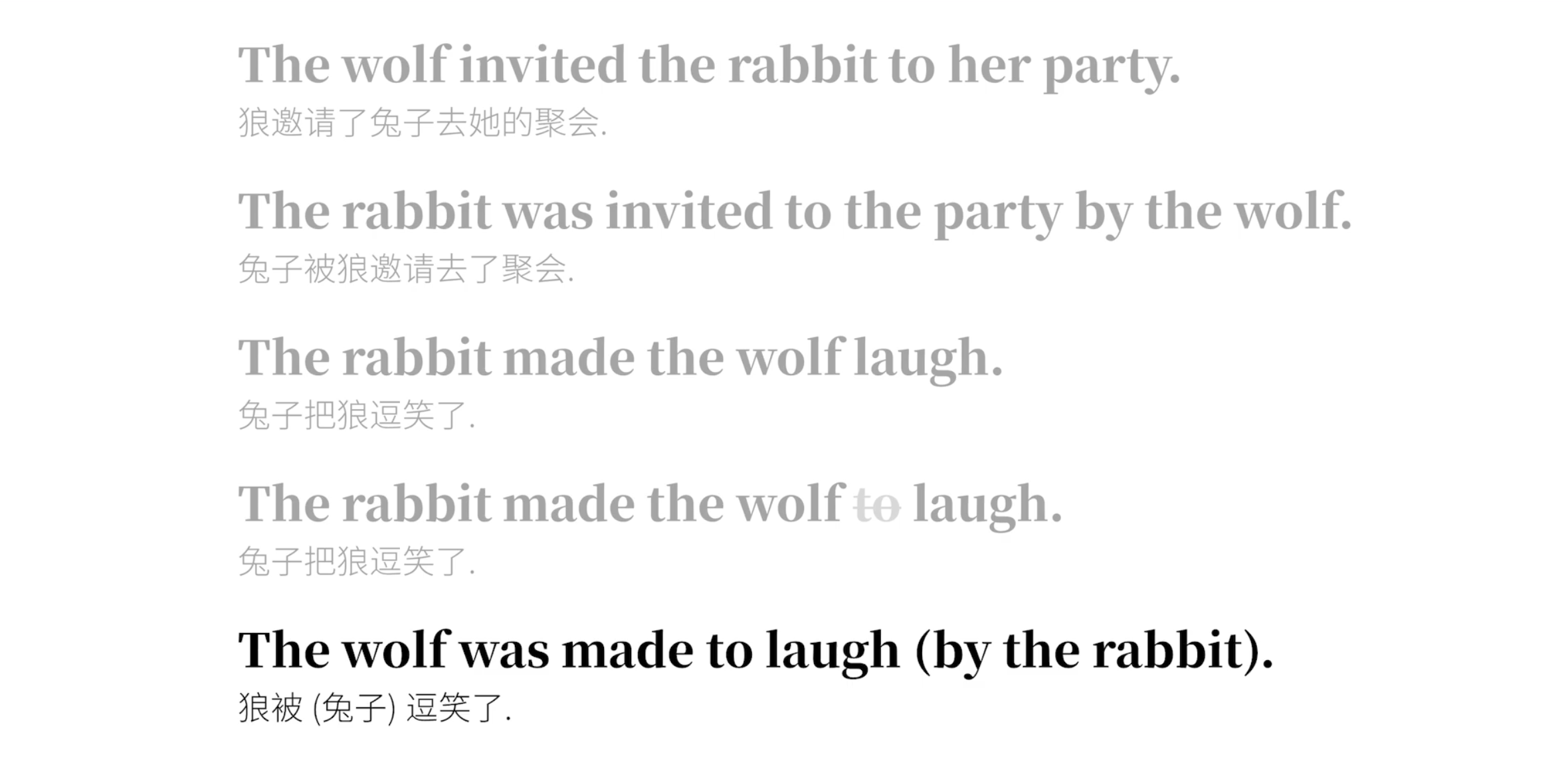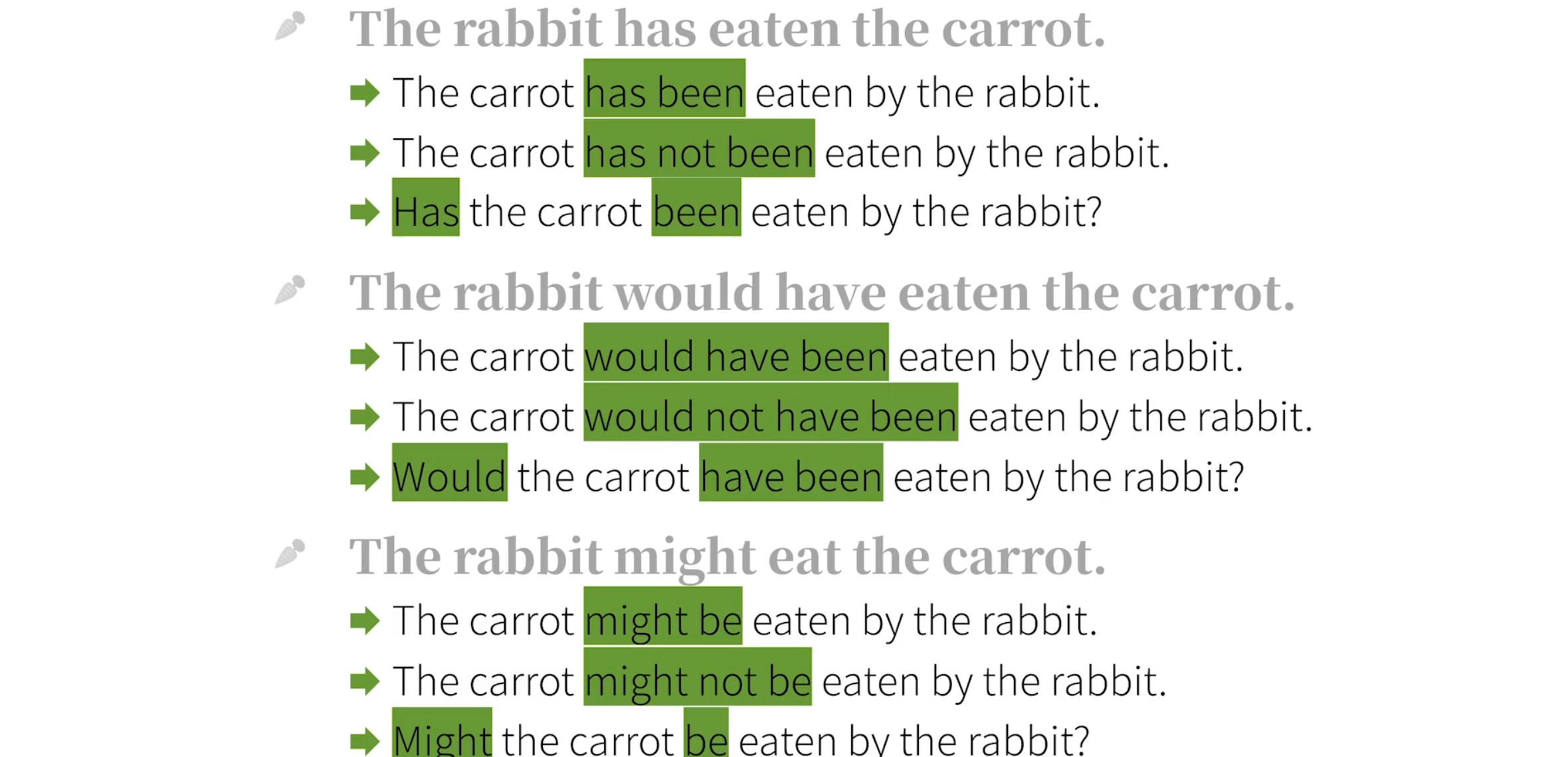被动
被动

可能你已经很清楚了,英语语态分为两种,主动语态和被动语态。
你可能会问一句话,用主动语态就能表达清楚的事,为什么还要用被动语态来说。你可以想象一下,突然听到有人喊,”不好啦!兔子咬人啦!“,你的第一反应多半是,哇,兔子急了,是兔子不是别人。这句话中,显然兔子是咱们关注的重点。然后你第二反应多半是,谁这么大胆,居然敢惹兔子。接着你会顺理成章的进一步八卦,询问谁被兔子咬了。你想想,你说的这句话在强调什么呢。可不再是兔子了,而是那个吃了豹子胆的谁。嗯,吃了豹子胆被兔子咬可还行。
所以你明白了,咱们在第一句话中想要强调谁就会充当主语。如果强调动作的执行者,譬如兔子做出咬人的举动,句子会用主动语态。如果强调动作的承受者,譬如谁被咬,句子就倾向用被动语态。中文都会用被来表达被动,那英文又是如何表达的。看过英语兔语法综述视频的小伙伴,一定对谓语动词这个概念不陌生,因为它在句子成分中占据核心地位。其实被动语态的构成也是通过微语动词的变化完成的。
那不妨通过 5 种基本句型来看看它们的被动语态是怎么演化的。如果你已经忘记了 5 种基本句型,那说明你需要好好复习语法综述视频了。

- 主+谓 The rabbit slept. 兔子睡觉,你可能已经发现这个句子的谓语动词后没有宾语,这是因为 slept 原型 sleep 是个不及物动词,不存在动作的承受者这个概念,自然就没有被动语态了。

- 主+谓+宾 The rabbit ate the carrot. 兔子吃了胡萝卜。主语 the rabbit 是动作 ate (原型 eat) 的执行者, the carrot 是动作 ate 的承受者。

如果变成被动语态,就是强调动作的承受者。让 the carrot 称为主语,咱们就首先要调换主语和宾语的位置。

The carrot ate the rabbit胡萝卜吃了兔子。

哇,真的是植物大战兔子了,这样太可怕了。为了兔子的生命安全,咱们先来看看被动语态的构成吧。“be + 过去分词” 看上去是不是很简单。

一起把上面那个句子改造一下 The carrot is eaten the rabbit. 不过咱们得注意,刚才主动句中明明是一般过去时改,到现在 is 都出来了。不对呀,那你再开动脑筋想想 be 动词应该用 is 的过去时态不就是 was 吗。

那么咱们再把这个句子改写一下 ~~The carrot was eaten the rabbit.~~是不是还有些奇怪。应该是被兔子吃才对啊。如果需要表明动作的执行者是谁,那就要借助 by +动作的执行者。所以再完善一下这个句子

- The carrot was eaten by the rabbit. 胡萝卜被兔子吃了。
哇,这个被动语态的句子终于完成了,我们可以喘口气了,因为兔子终于安全了。很多情况下,无需表明被谁这一概念,例如经常看英语兔视频的你,也许早已熟知其中套路,所以当我问胡萝卜被谁吃时,你一定会把兔子打在公屏上。

所以这个句子写的简洁一点 A carrot was eaten.咦,好像这个句子有点眼熟。再回想一下,在非谓语动词里,过去分词作主语补语,也就是表语的句子 The rabbit was frightened.兔子感到害怕,兔子害怕是被谁吓的。咱们是不是可以这样理解 The rabbit was frightened by the wolf.兔子被狼吓着了,所以过去分词表被动的意义和被动语态脱不了干系。
- 主+谓+宾+宾 The rabbit gave the carrot to the wolf. 兔子给了狼。

萝卜在这个句子里有两个宾语,直接宾语 the carrot 和间接宾语 the wolf ,如果强调间接宾语 the wolf 。

The wolf was given the carrot by the rabbit. 狼被兔子给了胡萝卜。如果强调直接宾语,
The carrot was given to the wolf by the rabbit. 胡萝卜被兔子给了狼。

当然了,如果都知道兔子给狼,胡萝卜可以把 by +动作执行者这一部分去掉。所以上面两个句子可以简写成
The wolf was given the carrot.
The carrot was given to the wolf.

如果这个句子主动形式写成 主语+谓语+间接宾语+直接宾语 的形式,那 to 就消失了。The rabbit gave the wolf the carrot.但在强调直接宾语 The carrot 便被动句时,可不能是 The carrot was given the wolf. 它和之前那句带介词 to 的主动句变成被动态是一样的,所以应该还是。
- The carrot was given to the wolf by the rabbit.
千万不要漏 to,
- 主+谓+宾+宾补

The wolf invited the rabbit to her party. 狼邀请了兔子去了他的聚会。改成被动语态。
The rabbit was invited to the party by the wolf. 兔子被狼邀请去了聚会。
The rabbit made the wolf laugh. 兔子把狼逗笑了 。
make 等后接的事省略了 to 的动词不定式。 你还记得英语兔我之前说的吗。 这种不带 to 的动词不定式也被称作 Bare infinitive ,如果不熟悉,建议你去观看非谓语动词中动词不定式的视频。 所以原句实际上相当于 The rabbit made the wolf to laugh. 一旦省略了 to 的动词不定式,做宾补改成被动语态时,要把 to 还原,所以改成被动语态。 应该是
- The wolf was made to laugh by the rabbit 狼被兔子逗笑了。

- 主+系+表(主语补语) The rabbit is smart 兔子聪明绝顶,看看这个句子怎么变成被动态,给你几秒钟思考时间。 叮,很明显,这种句型没有办法变成被动语态,咱们就别在上面费劲了。 好,以上就是英语中的被动态的基本知识,其实被动态可以更复杂,如果被动态和时态、语气、情态助词相结合的话,就会产生一系列化学反应。 比如

The rabbit has eaten the carrot. 变成 The carrot has been eaten by the rabbit.
The rabbit would have eaten the carrot. 变成 The carrot would have been eaten by the rabbit.
The rabbit might eat the carrot. 变成 The carrot might be eaten by the rabbit.
还可以变为否定
The carrot has been eaten by the rabbit.
The carrot has not been eaten by the rabbit.
The carrot would have been eaten by the rabbit.
The carrot would not have been eaten by the rabbit.
The carrot might be eaten by the rabbit.
The carrot might not be eaten by the rabbit.
或者提问
The carrot has been eaten by the rabbit.
Has the carrot been eaten by the rabbit?
The carrot would have been eaten by the rabbit.
Would the carrot have been eaten by the rabbit?
The carrot might be eaten by the rabbit.
Might the carrot be eaten by the rabbit?
但其实归根结底,这些变位主要是针对构成被动语态所需的 be 动词的变位,所以也是很有规律的。
